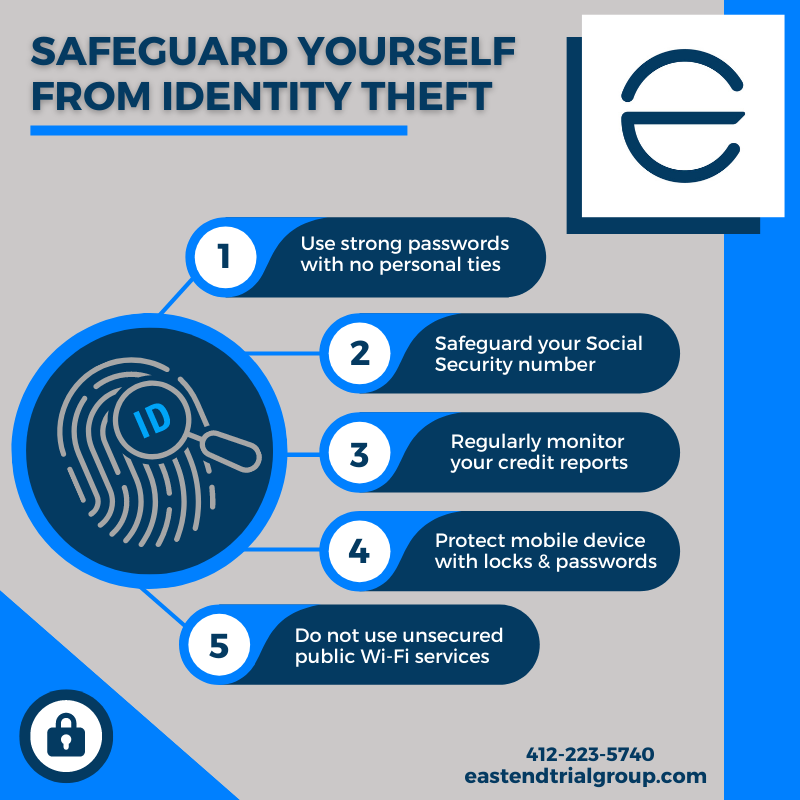
Today’s world relies on databases and complex computer systems that electronically store massive amounts of information on millions of people. This information includes personal, financial, and medical data. Identity theft occurs due to fraudulent business practices or an individual defrauder.
Many people providing their personal information, either online or over the phone, expect it to be secure and protected from identity theft. Unfortunately, the reality is that individual identity theft has become increasingly more prevalent.
Individual identity theft involves an anonymous person fraudulently obtaining another person’s personal and financial information. The defrauder may use this information in several ways for different reasons, including the following:
- Stealing money.
- Making expensive purchases.
- Ordering credit cards.
- Setting up cellphone accounts.
- Seeking medical treatments.
- Taking tax refunds.
- Committing other crimes.
Data breaches are also a leading cause of identity theft, as they impact massive groups of people at once. Nearly every industry collects and stores the personal and financial information of clients into databases, including retail, medical, and banking. Hackers look for vulnerabilities in the organization’s databases that allow them to bypass security measures. If successful, they are able to gain access and steal valuable information that can be used or sold for identity theft purposes.
Data breaches can result in theft of a lot a person’s sensitive information, including:
- Date of birth.
- Social Security number.
- Home and/or work addresses.
- Home and cellphone numbers.
- Credit card and bank account numbers.
- Personal identification pins.
- Health insurance information.
- Medical records.
- Investment accounts.
- Utility accounts.
What Are Leading Causes of Identity Theft?
When companies are not vigilant in protecting customer information and conducting regular security measures to detect data compromises, they are making consumers vulnerable to identity theft. Some common causes of identity theft include:
- Technological vulnerabilities: All software applications have technical vulnerabilities that skilled hackers can discover and exploit, potentially through thousands of organizations. Software companies run routine checks of their applications to find and address vulnerabilities before hackers discover them and provide users with a “patch,” which is to be applied to the existing program. This can be a risky period for some businesses, as thieves become more aggressive in their tactics once they learn of the software’s flaw. Defrauders often target organizations who have not yet applied the patch to their systems.
- Weak and stolen passwords: One of the most common causes of identity theft is stolen passwords. This can be surprisingly easy with the right technology. Despite warnings about protecting passwords, people still routinely use simple and popular passwords. Passwords that include personal information, such as a date of birth or family name, can be easily discovered. Hackers often employ computer programs that comb through millions of the most popular passwords and phrases in order to gain access to personal and financial information through the organization’s customer login information.
- Malware: Cyber criminals frequently use malicious software, known as malware, to easily gain access to millions of data. Once developed, they search for technology systems with known vulnerabilities and plant the malware. This allows the information to come to them or gives them the ability to lock the system from other users.
- Malicious insiders: In many companies, employees have access to countless amounts of sensitive, personal, and financial information on millions of individuals. This gives potential defrauders the ability to sell and exploit personal information. Disgruntled employees and those who parted on poor terms might still have access to the systems, which can lead to serious compromises for their companies.
When Are Individuals Most Susceptible to Identity Theft?
Certain times of the year brings more opportunity for consumer fraud, including identity theft. The winter holiday season is a time when thieves are looking for additional ways to take advantage of unassuming consumers. The summer months are also when identity theft becomes more widespread. While it is considered a time for relaxation and distraction from school and work schedules, it is also exactly what thieves are anticipating as they plan their summertime schemes.
Many individuals plan vacations and other fun activities with their family and friends during the summer. This brings more opportunities for thieves to take advantage of people booking vacation rentals, tickets, and other online purchases.
The following are some things to be especially aware of:
- Third-party bookings: If you book vacation rentals, airfare, rental cars, or any other travel arrangements through a third-party website, you are vulnerable to identity theft. Defrauders may call you directly after bookings to attempt to gain more personal information, which is something legitimate companies are not permitted to do. You should also never provide credit card information, an advanced rental, or fee payment to an unfamiliar website. The same applies to anyone who calls claiming to work at the front desk of a hotel.
- Ticket sales: Numerous websites offers concert, festival, sports, and other events that often sell out. Identity thieves take advantage of this and list fake tickets online for discounted prices. Individuals can also be tricked into wiring money or making gift card payments for hard-to-get tickets that do not exist. It is important to research ticket vendors and use legitimate sources where you have protection against fraud before making any type of payment.
Generally, using a credit card instead of a debit card is always advisable. There are more available protections with credit cards, and it is easier to dispute any unknown charges.
Are There Federal Laws Protecting Against Identity Theft?
The rise and widespread use of technology over the past several decades has also contributed to the rise in identity theft. Regular use of computers, cellphones, and other devices that access the internet can make personal and financial information vulnerable to thieves. Recognizing this, federal and state lawmakers have enacted laws to protect consumers by holding businesses to higher data protection standards under the Fair Credit Reporting Act (FCRA) to reduce identity theft, such as the following:
- Identity Theft and Assumption Deterrence Act: This law establishes identity theft as a federal crime when personal and financial information is transferred or used with authority and used to commit crimes in violation of federal laws or is considered a felony under state and local laws.
- Identity Theft Penalty Enhancement Act: An amendment to the federal code, this Act establishes penalties sentences for identity theft.
Can I Sue if My Identity Has Been Stolen?
Typically, the theft involves outsiders gaining access to the company’s technology systems and remaining anonymous and unaccountable for the crime. However, liability may remain on the company for lack of security and protection of client information.
You have the right to sue a company who did not keep your personal or financial information secure if you are able to prove that the organization’s lack of security features exposed clients to thieves. You may be entitled to compensation for the following:
- The cost of correcting, changing, or replacing personal and financial information, including bank account numbers, debit and credit cards, driver’s license and other government-issued identifications, and other stolen information.
- Expenses incurred for identity monitoring and protection, identity repair, and identity insurance services, or related fees after a data breach.
- Credit report and credit insurance costs.
- Out-of-pocket expenses incurred due to a data breach.
- Emotional damages, including damage to your credit and reputation, invasion of privacy, and emotional distress.
When pursuing a lawsuit, the court expects to see evidence that you took reasonable steps to protect yourself and your information, including:
- Changing bank account numbers.
- Creating new passwords for all accounts compromised.
- Contacting the bank regarding unusual activity and fraudulent charges.
- Canceling debt and debit cards that have been affected.
Without taking these measures, the court may decrease the amount of compensation you are entitled to or deny the case altogether. It is also important to maintain all records and information related to a data breach, such as correspondence with the company, your financial institutions, and the relevant website. Preserving confirmation of the changes you made to your accounts due to the breach is important. Lawsuits for identity theft due to data breaches are complex, and it is in your best interest to hire an attorney to represent you.
How Can I Protect Myself From Identity Theft?
To prevent thieves from gaining your information, regularly monitor your accounts and implement additional security measures that can help you protect yourself. Some important protective measures include:
- Use strong passwords with no personal ties, and add a single or double authentication step.
- Safeguard your Social Security number; ask why it is needed and how it will be protected when you are asked to provide one.
- Utilize text, email, or phone alerts when activities involving your accounts are made.
- Use a digital wallet that encrypts and tokenizes your credit and debit transactions.
- Regularly monitor your credit reports, financial, and medical statements for fraudulent activities.
- Protect your mobile device with locks and passwords.
- Use banking apps rather than mobile browsers.
- Do not use unsecured public Wi-Fi services.
Pennsylvania Identity Theft Lawyers at East End Trial Group Represent Clients Compromised by Identity Theft
Having your identity stolen is an emotional and financially devastating experience. Trying to repair the damage that an identity thief inflicts on your personal and financial life is complex and can take years to repair. If you have had your identity stolen, one of our experienced Pennsylvania identity theft lawyers at East End Trial Group can help you get your life and finances back on track. Call us at 412-223-5740 or contact us online for a free consultation. Located in Pittsburgh, we serve clients throughout Pennsylvania.

 Call Us Today 412-223-5740
Call Us Today 412-223-5740